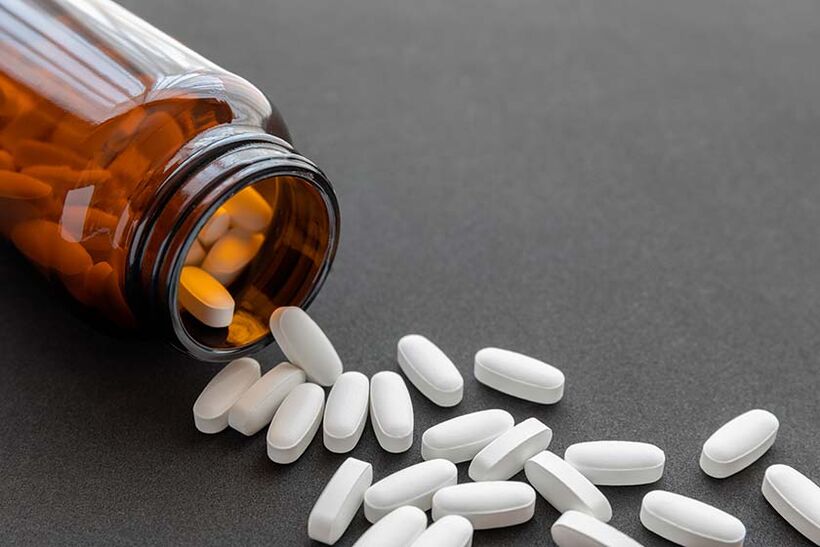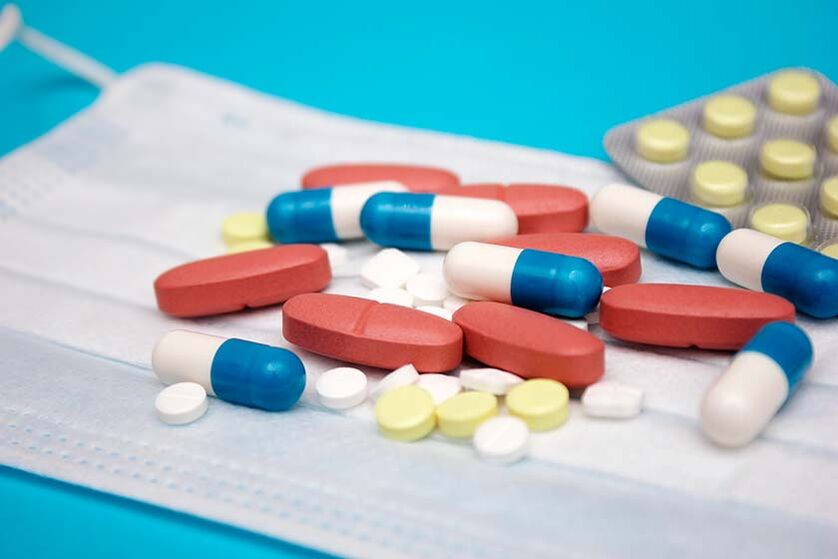Scientists disagree whether alcohol is compatible with antibacterial drugs.Some experts believe that taking alcohol after completing the treatment process will not lead to worsening of health.Among doctors, this approach has more opponents.
Refusal to drink during and after treatment: What experts say
The composition of antibacterial drugs includes synthetic substances that destroy viral microorganisms.When ordinary drugs are useless, they are prescribed.On the one hand, antibacterial drugs help cure people's serious illnesses.On the other hand, the drugs in this group are highly toxic.During the treatment process, the doctor advises the doctor to drink liver therapeutic agents to hold the liver.
Alcohol after antibiotics can significantly increase the load in the body.Whether to use alcohol during antibiotic treatment is open.
Experts have identified several reasons why you refuse to drink during treatment:
- The effects of taking medication at alcohol level.The active substances of antibiotics interact with microbial proteins, affecting them and changing structures.Alcohol molecules modify proteins and weaken chemical bonds.
- The liver will bear heavy loads during treatment with any medication.If a person drinks alcohol, he can put extra stress on his body.As a result, toxic hepatitis occurs, cholestasis in the liver, and the outflow of bile is difficult, and the inflammation process of the bile duct and liver will occur.
- The interaction of alcohol and antibiotics can cause significant deterioration of the wellbore.The reactions of disulfiram are accompanied by fever, nausea, headaches, and in the worst case they can lead to coma and death.The drugs in this group are used to treat alcoholism.
Alcohol drinks contain substances that cause the drug in the intestine to absorb too quickly, and even remove it faster.
How long after the antibiotic process can you drink alcohol?The term depends on the medication and duration of the treatment process.Certain types of antifungal drugs, as well as penicillin, Heliomycin is compatible with small doses of concentrated beverages.To avoid unpleasant consequences, it is recommended to give up on them altogether or consult a doctor.In special cases, alcohol and antibacterial drugs should be combined.
3-5 days after the antibiotic is completed, the doctor is allowed to drink alcohol.This time it is enough to eliminate the toxic substances and can respond adequately to alcohol.If the patient has a chronic disease form and repeatedly resorts to antibacterial treatment, alcohol should be taken and you should avoid it for 2-4 weeks.

Alcohol after antibiotics: Prospects and consequences
There is no clinically confirmed fact that the view that absolute alcohol is incompatible with any drug.This is a myth.There are separate treatment types, during which doctors recommend not including alcohol.The consequences of use are not necessarily fatal, but there is a great prospect for developing possible complications.
The following table shows examples of negative reactions to alcohol in the body.It should be noted that unpredictable situations may occur due to taking completely “harmless” medications.To find out how much alcohol you can drink after antibiotics, you can hire a doctor before taking the medication.
| Drug Type | Results of combination with alcohol |
| aspirin | Gastric ulcer |
| Caffeine, ephedrine. | Hypertension crisis |
| Diuretic, low intensity. | The pressure drops sharply |
| paracetamol | Toxic liver damage |
| Insulin, a drug that reduces sugar levels. | The sugar in the blood drops, coma |
| Neurotherapy, painkillers, anti-inflammatory drugs | Poisoning. |
| Cross-exhaust, sleeping pills | Poisoned, coma |
| Sulfinamide | Lack of effect, intolerance to individual substances. |
| niprolcerin, antihistamine | Allergies, increase pain |
The preparation of ethyl ethane groups slows down the chemical reaction of alcohol molecules.As a result, a person experiences all the signs of poisoning: dizziness, vomiting, headache, shortness of breath.Disulfide is a high content of anti-alcohol ingredients used for treatment-dependent treatment.The dose of alcohol in the slightest deteriorated greatly.The minimum abstinence of using strong drinks is one week.
Another drug that does not bind well to alcohol-metronidazole.Alcohol after this antibiotic can lead to poisoning.However, this judgment has not been scientifically confirmed.In 2003, medical scientists conducted experiments.During the treatment of Horbera, a small group of Finnish men drank regularly and then shared the results.Five days after starting antibiotics, alcohol proved to have no negative effects.The organizers of the study stress that to avoid negative consequences, you should not combine strong drinks with metronidazole.
There are many more drugs that cannot be combined with alcohol:
- tinedazole;
- linezolide;
- erythromycin;
- Sodium thiosulfate;
- metatoxin;
- cyanamide;
- Carboimide calcium;
- disulfide number;
- Smoke lithium;
- naltrexon;
- Dimerkaprol;
- Nalmefen.
Doctors immediately warn patients about the dangers and consequences of combining antibacterial drugs with alcohol.
The question is, what is the possible alcohol volume after antibiotics are interested in many citizens.I want to use strong drinks without fear.These fears are not in vain.
Results of binding beverages to antibiotics:
- Transition from disease to chronic form.Microorganisms are resistant to specific substances, and the effect of treatment disappears.The treatment process is delayed.
- Deterioration of blood indicator.Increased coagulation leads to the development of cardiovascular pathology.The risk of stroke or heart attack is repeatedly increased.
- The occurrence of allergic reactions.Antihistamines prevent mild attacks.In severe forms, allergic shock and Quincke edema occur.
To find out how much alcohol you can drink after antibiotics, you can consult a doctor.
Compatible drugs
Doctors allow the combination of strong drinks with certain types of antibacterial drugs.List of “safe” antibiotics:
- cephalosporin;
- Penicillin preparation;
- Macrolides.
Patients taking penicillin-based medications within 4-5 hours after the end of the course should avoid drinking alcohol.During this period, the active substances of the drug dissolve and attenuate.Attenuation products are excreted through the excretion system.
Scientific Methods
Researchers surveyed the population of England.Of the 300 patients, more than 80% of the clinic thought that beverages would have a negative impact on the drug’s effects, and 71% were afraid of the consequences of this combination.
The fact is that the greatest danger lies in the formation of resistance to drugs.When suffering from non-systemic drugs, the microorganisms become resistant.The drunk patient was afraid of the consequences, so he refused to continue treatment.
Why can’t you drink alcohol during treatment with antibacterial drugs?Systematic abuse of beverages combined with severe medications can cause organ work to malfunction.Systemic beverages can worsen immunity, and therefore the risk of developing various pathologies increases.

Recovery: Recommended
How much time does it take to recover after taking alcohol?Doctors can say what is the deadline for breeding specific drugs.Depending on the type of antibacterial drug, this period can be extended by several days.An important criterion is the duration of the course.The longer the treatment time, the more time it takes to recover.
In several cases, doctors are not allowed to drink alcohol after antibiotics:
- Diseases occur in chronic form, where the liver develops toxic load.
- Take other medications at the same time.The recovery period in this case is delayed to 6 months.
Experts say: It takes 1 year to fully recover the body after the antibiotic process.Currently, a person greatly increases the risk of colds, flu and other infectious diseases.
During drug treatment, the intestines are under heavy load.Digestion is disturbed, metabolism is slowed, vitamin malabsorption is poor, and allergic reactions are intensified.
Experts agree that you can drink alcohol after antibiotics a few weeks after stopping treatment.In some cases, it is recommended to minimize alcohol use.
You can help your body behave properly by drinking probiotics.They are rich in bifido and Lactobacillus, vitamins, amino acids, and enzymes.Probiotics are drinks for 2-3 weeks during or after treatment.
Benefits of the product:
- Reduce toxic load on the liver and kidneys;
- Strengthen immunity;
- Restore intestinal flora balance (local immunity);
- Normalization of digestive processes;
- blocking toxins and allergens;
- Improve vitamin assimilation.
If the antibiotic treatment process is violated, the risk of resistance increases.
Alcohol after antibiotics: How long can you drink alcohol
Some antibiotics are excreted at the individual.The blood system and blood vessels are released from aminoglycosides within 3 hours.Two weeks later, the unfortunate residue of the drug located in the open-air liquid left the body.Uncontrolled use of strong drinks before this period can lead to absolute deafness.
If medication is used repeatedly, your doctor recommends that you wait for a strong drink.This applies to all drugs.You can’t drink alcohol after antibiotics on the same day or within a few hours after treatment.
3-5 days after the end of treatment, beverages belonging to light alcohol (beer, wine) are allowed.With stronger alcohol, it is necessary to postpone it.The doctor recommends that you wait 10-12 days.Reluctance to follow the negative consequences that can lead to the death of the patient.























